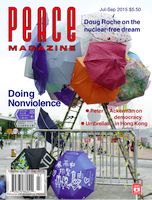
Peace Magazine Jul-Sep 2015, page 2. Some rights reserved.
Search for other articles by peacemag here
The Republic of the Marshall Islands (RMI) is suing the United States and the eight other nuclear powers, demanding not compensation but nuclear disarmament. In February of this year, the case against the US was dismissed in a San Francisco court.
However, the cases are continuing. The US decision will be appealed on July 13 in the Ninth Circuit Court of Appeals. The US will then have one month to reply, and after its brief is filed, the Marshall Islands will have two weeks to file their own reply brief. Some NGOs are preparing amicus curiae briefs in support of the Marshall Islands case. There may be an opportunity for other organizations to submit letters of support to the court. All those who are interested in doing so should contact Rick Wayman for advice: rwayman@napf.org.
Cases are proceeding in the International Court of Justice against the three nuclear weapons states that accept the compulsory jurisdiction of the court: the United Kingdom, India, and Pakistan. On June 15 the UK filed preliminary objections, claiming that the Court has no jurisdiction and that its case is not otherwise appropriate for adjudication. Hearings are expected in early 2016 on whether the three cases are suitable for decision on the merits.
The court has appointed Judge Mohammed Bedjaoui as a judge ad hoc in these cases. He was president of the court when it rendered its advisory opinion on nuclear weapons in 1996.
Source: Rick Wayman, Nuclear Age Peace Foundation.
Political opponents of human rights workers often claim that they are working for the interests of foreign powers, not the local people. Lately, however, some scholars have undertaken sample surveys to determine whether the public shares these views.
James Ron, Shannon Golden, David Crow, and Archana Pandya have polled citizens in four regions of the world, finding that the general attitude towad human rights workers is quite positive. They began by interviewing experts, activists, and workers in 60 countries, asking them to comment on how the public viewed them. Then they developed a battery of questions which they deployed in Mexico, Morocco, India, and Nigeria between 2012-14. The researchers were surprised to find that the responses were quite similar in all four regions of the world. “Across all four cases, respondents were far more likely to associate human rights with positive sounding than negative sounding phrases. …Associations of human rights with foreign intervention, moreover, received little support.” Nowhere is the public inclined to consider human rights work as “promoting US interests” or “promoting foreign values and ideas.”
Instead, they more often considered the work to involve promoting free and fair elections, promoting socioeconomic justice, protecting people from torture and murder, and protecting women’s rights.
Source: Open Democracy. June 29, 2015.
In 2009 Ethiopia adopted a repressive NGO law, and now other countries in Africa are adopting similar legislation. Last year Kenya shut down 500 NGOs for non-compliance with its laws, accusing some of them of using their charitable status as a front for raising cash for terrorism. In May, South Sudan passed a law that would prohibit aid agencies from having more than a fifth of their staff consist of foreigners. The bill is still awaiting the president’s signature.
Now Uganda is the next country in which such legislation is pending to restrict NGOs. The bill was published in April and must be debated in parliament before it can be passed into law. The minister of internal affairs stated that “the rapid growth of non-governmental organizations has led to subversive methods of work and activities, which in turn undermine accountability and transparency in the sector.”
There are about 11,000 registered NGOs in Uganda. According to Nicholas Opio, the executive director of Chapter Four Uganda, the law “would extinguish the very character of non-governmental organizations and make them puppets of the state. It unustifiably restricts the space for civic engagement, civic association and civic participation in governance and in service delivery.”
Source: Alon Mwesigwa in the Guardian, 24 June 2015.
In the first successful case of its kind, a judge in the Hague has ruled in favor of 886 Dutch citizens who sued their government for not protecting them from climate change. Calling the government’s actions illegal for not protecting its citizens, the court ordered it to act to cut greenhouse gas emissions by 25% within five years.
Although this ruling only applies to the Netherlands, lawyers say that the precedent could be followed in similar cases around the world.
Source the Guardian, June 24.

Peace Magazine Jul-Sep 2015, page 2. Some rights reserved.
Search for other articles by peacemag here